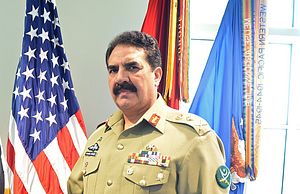It appears that relations between Afghanistan and Pakistan are creeping back toward normalcy after a falling out late this summer. Pakistan’s Chief of Army Staff General Raheel Sharif, arguably the most powerful man in the country, met with senior Afghan officials in Kabul over the weekend to discuss Pakistan’s role in underwriting peace talks between the Afghan government and the Taliban.
Since the falling out between Kabul and Islamabad, which took place after Afghan President Ashraf Ghani’s government initiated a major bilateral rapprochement in early 2015, the Afghan government has seen the threat from the Taliban rise considerably. Peace talks between the government and the insurgents broke down over the summer. Since a recent multilateral conference on Afghanistan, relations between Islamabad and Kabul have improved, creating the conditions for Gen. Sharif’s latest visit.
Gen. Sharif’s visit to Kabul focused on more than just peace talks between the government and the Taliban. According to Asim Bajwa, a spokesperson for the Pakistani military, the general’s agenda in Kabul focused on joint counter-terrorism efforts, border monitoring, and administrative issues. Bajwa also noted that Gen. Sharif visited Bagram Air Base, the largest U.S. military base in Afghanistan, now under Afghan government control, and met with Gen. John F. Campbell, the current commander of the Resolute Support Mission and United States Forces-Afghanistan.
Gen. Sharif’s visit to Afghanistan comes weeks after he met with a range of senior leaders in the United States to discuss stability in Afghanistan, among other issues. While in Washington, the Pakistani general met with U.S. Secretary of State John Kerry, Secretary of Defense Ashton Carter, Vice President Joe Biden, CIA Director John Brennan, Army Chief of Staff General Mark Milley, and his effective counterpart in the U.S. military, General Joseph Dunford, the chairman of the joint chiefs of staff.
As I discussed last week, officials from both Pakistan and Afghanistan are optimistic that the climate exists for renewed peace talks early in the new year. For the Afghan government, peace talks with the Taliban are a particular priority at this moment as the group appears to have acquired newfound vigor on the battlefield. As the brief takeover of Kunduz by the Taliban demonstrated, the Afghan government’s grip on territory is questionable.
Furthermore, as a recent report in the Washington Post noted, top Afghan and U.S. officials are increasingly pessimistic about the situation on the ground, fearing that the Taliban is making territorial gains that will be difficult to reverse without a major ground force commitment. That same report notes that, according to Afghan and western officials, ” the Taliban now holds more territory than in any year since 2001.”
Gen. Sharif’s visit suggests that expectations for a new round of peace talks with Islamabad’s imprimatur were well-placed. What is less certain is if those peace talks will lead to even modestly positive outcomes, such as a ceasefire. Heading into 2016, officials in Kabul will be desperate for the peace talks to yield dividends on the ground, lest the country’s security situation continue to decline next year.

































